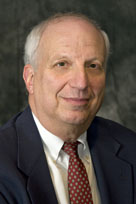 Most weekend mornings, a small group of men gathers at the front table of Peet’s coffee in Newton Center to gab about breaking news, politics and whatever else catches their fancy. It’s hard to imagine the gathering without one of its regulars, former State Representative David Mofenson, who died suddenly on Sunday morning just steps away from Peet’s. His death leaves a staggering hole in the hearts of family, friends, colleagues and others whom he had touched in his roles as an attorney, lawmaker, election commissioner, history lover, baseball aficionado, stamp collector and neighbor.
Most weekend mornings, a small group of men gathers at the front table of Peet’s coffee in Newton Center to gab about breaking news, politics and whatever else catches their fancy. It’s hard to imagine the gathering without one of its regulars, former State Representative David Mofenson, who died suddenly on Sunday morning just steps away from Peet’s. His death leaves a staggering hole in the hearts of family, friends, colleagues and others whom he had touched in his roles as an attorney, lawmaker, election commissioner, history lover, baseball aficionado, stamp collector and neighbor.
At six feet seven inches, David stood head and shoulders above most of us. But despite his physical angularity, he had no sharp elbows. He was gentle, considerate, caring, and great fun to be with. He loved history and was board chairman of the Spellman Stamp Museum. He was passionate about baseball, and, as former State Rep. Phil Johnston recalled, “He was my chairman and a good friend, and he knew more about baseball than anyone else I’ve ever met. ” My husband and I were his guests at the sixth game of the 2007 ALCS series against Cleveland, as exciting a Red Sox game as I have ever been to. David relished it, despite his extreme discomfort with the small size of the seat and no place to put his long legs.
Always a defender of the underdog, David always thought that Red Sox Vern “Junior” Stephens, one of the top hitting shortstops in baseball history, should be in the Hall of Fame. He thought Stephens’ career was simply overshadowed by that of Ted Williams and that to ignore him wasn’t fair. At the time of David’s death, he was writing a book about Stephens.
David represented Newton in the legislature from 1971 to 1981. He was the first politician featured in the first issue of The Newton Times (which I had just joined as a reporter) in September of ’71. He was one of the first legislators to speak out in favor of the concept of informational privacy. His immediate concern was that state government was selling personal information about vehicle registration to companies marketing car-related products. He succeeded in stopping the sale of those data and later fathered the state’s Fair Information Practices Act, giving us access to our credit reports and restricting intrusion into our other records. In that same issue, I also came across a resolution he had sponsored memorializing the Mass. congressional delegation to vote against sending military aid to the violent and repressive regime in Pakistan. His interests were all-encompassing.
His passion for the underdog probably helped to explain his steadfast commitment to social services, and he served as House Chairman of the Committee on Human Services from 1975-1981. From the dank warren of the committee offices in the basement of the State House, he helped shape policy affecting those in need of mental health, retardation, disability services and more. He led the fight against across-the-board welfare cuts pushed by Governor Mike Dukakis, who faced a huge budget deficit.
Mofenson just plugged away at issues like these, eschewing the power games and grandstanding of others in the leadership team (who enjoyed much nicer offices upstairs), making lives better for those in need.
In 1980, when Congressman Bob Drinan acquiesced to the Pope and announced he would not seek reelection to the 4th district seat, Mofenson decided to run for Congress. It was a a logical career progression. But then-State Rep. Barney Frank saw an opportunity and moved into the district to run for the Drinan seat. The Congressman’s organization largely went with Barney. As primary day approached, Barney and David were splitting the liberal vote, making it likely that the nominee would be the more conservative Waltham mayor, Arthur Clark. Pressure was put on David to drop out. A politician more driven by ego than principle would have stayed the course or negotiated some personal benefit. Not David. Trailing Barney in the polls, he urged voters to support Frank.
Further service to the community led him to chair the Newton Election Commission. Even his private practice of law reflected his deeply-held values. His philosophy was “listening to each client‘s needs, providing appropriate guidance, and caring about the outcome of each matter.” With David, those words were more than mere marketing.
Mofenson and his beloved wife, Caryn, were together for 50 years, a time that she says flew by. They had two sons, Dana and Jay, daughters-in-law and two grandchildren, babies whom he will never see grow up. David was a man of integrity, goodness, loyalty and, as the rabbi at his funeral declared, a real mensch. There is no nobler description.
I welcome your comments in the section below. To be alerted when a new blog is posted, click on “Follow’ in the lower right portion of your screen.